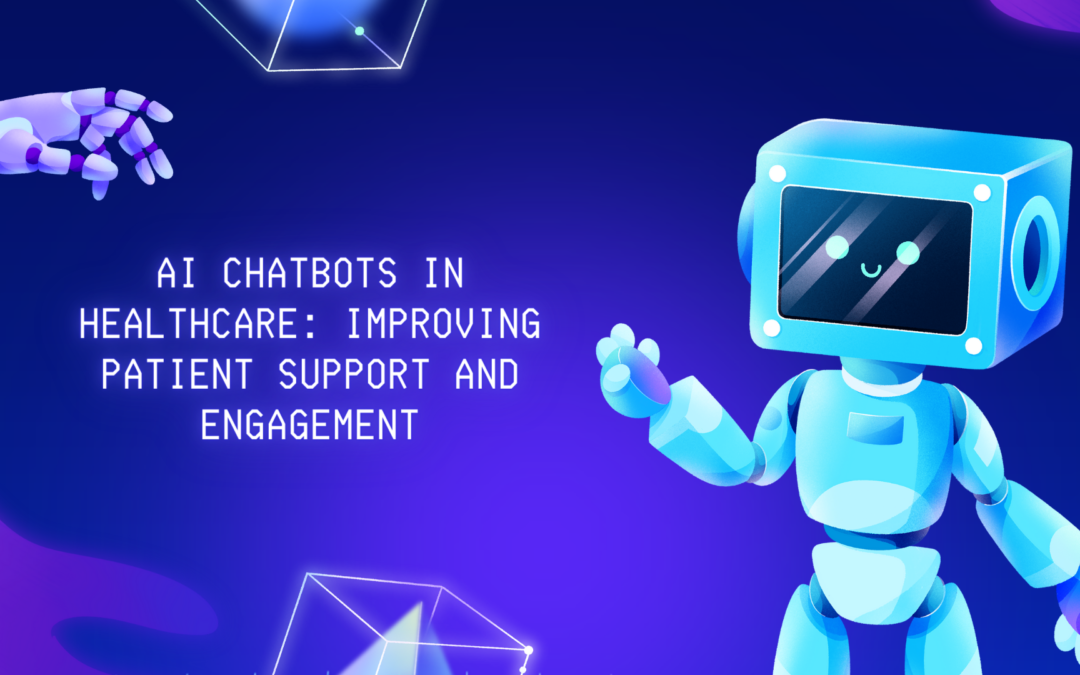Table of Contents
ToggleMedically Reviewed by Dr. Hanif Chatur
Key Takeaways
- Streamlined Administrative Processes: AI chatbots efficiently handle mundane administrative tasks such as appointment scheduling, billing inquiries, and insurance verifications, allowing healthcare staff to focus on patient care.
- 24/7 Patient Accessibility: With round-the-clock availability, AI chatbots offer patients instant responses to their healthcare queries, ensuring they receive timely support and guidance anytime they need it.
- Chat GPT-4’s Advanced Capabilities: The introduction of Chat GPT-4 in healthcare brings advanced natural language understanding, continuous learning from human interactions, and stringent data security measures, setting new standards in patient engagement and trust.
Learn more with MarkiTech...
The pace at which technological advancements have taken center stage in the provision of healthcare has taken the industry by surprise; one of the most promising innovations in this regard is the integration of AI chatbots. These AI-powered virtual assistants are proving to be major game changers in improving patient support and engagement. In this comprehensive article, we’ll navigate through the world of AI Chatbots in Healthcare, especially featuring Chat GPT-4 and Digital Health, and try to understand their transformative potential and the future of healthcare technology.
Introduction
“This is the world now; logged on, plugged in, all the time”. (John Connor).
If someone doesn’t know who John Connor is, then they’re quite likely to be from “The younger generation” – and I mean those born after 2005 – which means they’re also quite enamored with chatbots. They’ll talk to a bot just as often and as comfortably as they will to a human. In fact, between mom&dad and a bot, the bot has a better chance of getting a reaction. And that’s because the algorithms of the current generation of bots are very well-written. Almost human; almost. And the AI chatbots now being used in the healthcare industry are no different; in fact, they’re becoming really good at the game; some would say, a bit too good. These intelligent virtual agents, such as Chat GPT-4, are designed to provide personalized and timely assistance to patients, incorporating layers of detail and texture into their healthcare experience so that one feels almost as if one is talking to at least a young intern if not an experienced GP. AI chatbots are redefining patient support and engagement in the Digital Health domain and will be one of the major constructive influences on the future of healthcare technology, as long as they don’t say “I’ll be back” in an Austrian accent; (oh come on now; you’ve got to know this one).
The Different Kind of AI Chatbots, and their Roles in Healthcare
AI chatbots perform multifarious roles in healthcare, from automating the drudgery of mundane administrative tasks to offering actual medical advice. Let’s shine a bright light on their contributions:
Streamlining Administrative Tasks
In healthcare facilities, Administrative tasks are invariably time consuming and repetitive and, when one has been doing too much of it for too long in a day, one is increasingly likely to make mistakes; mistakes that can potentially cost lives or at least a suit. Being algorithm-driven (and not needing to go to the washroom or take calls from little Bobby at home), AI chatbots can efficiently handle appointment scheduling, billing inquiries, and insurance verifications, freeing up staff resources to be allocated to the actual business of patient care. Administrative processes run smoothly, mommy is not cranky when she gets home to little Bobby, and since mommy only did what she does best at work, the patients get a wonderful healthcare experience too. Win-win-win!!
Personalized Health Recommendations
Backed by mountains of data, algorithm-driven analyses and projections, and near-human text-scripting, AI chatbots are able to provide personalized health recommendations. They ask the right questions, analyze patient data, including medical history, take stock of current symptoms (maybe through RPPG), and general lifestyle factors, to offer tailored advice. This empowers individuals to make informed decisions about their well-being. For example, if a diabetic patient inquires about dietary changes they may need to make, the chatbot can suggest a personalized meal plan based on their specific needs and preferences.
Medication Reminders and Adherence
Digital Health is built around the philosophy of supporting patients to voluntarily adhere to their treatment plans. AI chatbots have a crucial role to play here, by making sure patients are able to follow their medication schedules religiously, through timely medication reminders. Patients often struggle with medication adherence, with serious consequences for their health. AI chatbots send automated reminders via text or voice messages, reducing the risk of missed doses and improving treatment outcomes. More importantly, these chatbots can answer the patient’s questions about medications, explain the necessity and/or benefits, and reinforce the importance of adherence.
24/7 Accessibility
Little Bobby might need to go for football practice, where he might break his teeth. Anything, really. And mummy wouldn’t be able to get back to work. But our trusty old AI chatbots would. They’re available round the clock, they’re not grumpy, or tired, or worried, and they provide instant responses to patient queries. This accessibility ensures that patients receive healthcare support whenever they need it, which definitely contributes to a positive experience overall. Whether it’s late-night panic regarding symptoms or a simple question about a prescription, the chatbot is there to walk you through the problem and provide accurate information and guidance, not only improving patient satisfaction but also contributing to better health outcomes.
Chat GPT-4: The Next Frontier
The newest kid on the block, Chat GPT-4, is proving to be so disruptive that people from all professional sectors are experiencing acute anxiety and fear for their livelihood. And it’s simply because it’s that good at what it does. As with other sectors, its remarkable capabilities are helping to shape the future of healthcare technology as well. Let’s try and figure out what’s causing all this paranoia:
Natural Language Skills
Chat GPT-4 boasts an advanced understanding of natural language, enabling it to comprehend and respond to complex medical queries with human-like fluency. This is a game-changer in patient engagement, as it allows for more meaningful and productive interactions between patients and AI chatbots. Patients can ask questions in their own words, and Chat GPT-4 has the ability to provide accurate and relevant responses, even working its way around colloquialisms.
Continuous Learning
Imagine a machine with a full range of human emotion. Once online, a sentient machine will quickly overcome the limits of biology. In a short time, its analytical power will be greater than the collective intelligence of every person born in the history of the world. Some scientists refer to this as the Singularity. I call it Transcendence.” (Lines from Transcendence 2014)
The AI chatbot continually learns from interactions with humans, picking up the nuances of language, the idiosyncrasies of human conversation, constantly becoming more “human-like”. The healthcare Chatbot does the same, staying up-to-date with medical advancements and ensuring that its recommendations are based on the latest research and guidelines. In the ever-evolving field of healthcare, having an AI assistant that constantly updates its knowledge is no longer negotiable; it’s a must-have. As it builds its repository of medical knowledge and repertoire of human-like conversational abilities, the medical Chat GPT-4 will begin to provide patients with the most current information and recommendations, contributing to better-informed decisions regarding their health.
Data Security
In healthcare, there is simply no room for compromise on data security. Chat GPT-4 places a strong emphasis on safeguarding patient information. Its developers have built robust encryption features into its algorithms and they ensure that it complies with stringent privacy regulations to ensure the confidentiality of patient data. When interacting with Chat GPT-4, patients need to be able to trust that their medical history and personal details are protected. This level of data security is critical to gaining patient trust and ensuring compliance with healthcare privacy laws.
Digital Health Revolution
The synergy between AI chatbots and Digital Health is driving a revolution in healthcare. Patients are now actively engaged in managing their own health, and healthcare providers are better equipped to deliver quality care. This transformation is not only improving patient support and engagement but also leading to better health outcomes.
We can now safely project a future where we see even more advanced AI chatbots that integrate seamlessly with Electronic Health Records (EHRs), allowing for a more comprehensive view of a patient’s health history. These chatbots may also play a role in remote monitoring of chronic conditions, helping patients and providers manage diseases more effectively.
Learn more with MarkiTech....
MarkiTech has various subsidiaries with products and services targeted towards digital healthcare and telehealth/telemedicine and virtual clinic with laser focus on helping seniors age in place and help their caregivers.
Sensights.ai is a company focused on remote patient monitoring and aging solutions, which utilizes artificial intelligence to track the health of patients and keep a round-the-clock connection between caregivers and patients.
As well, Veyetals uses rPPG and AI modeling algorithms to capture the light reflected by the blood vessels under a patient’s skin to measure vitals anytime, anywhere.
Lastly, we are now launched our latest Mental Health AI Scribe tool called CliniScripts.com








Recent Comments